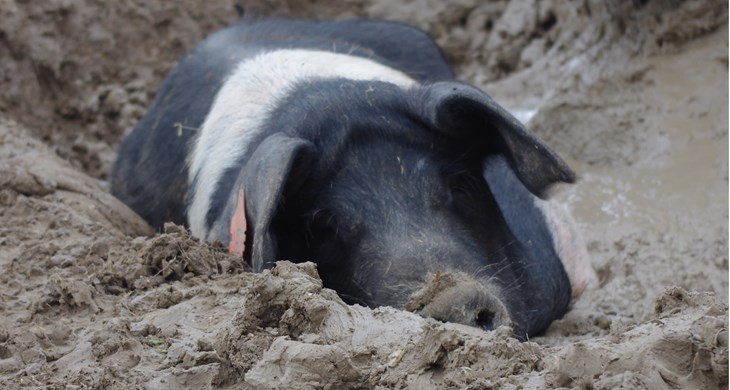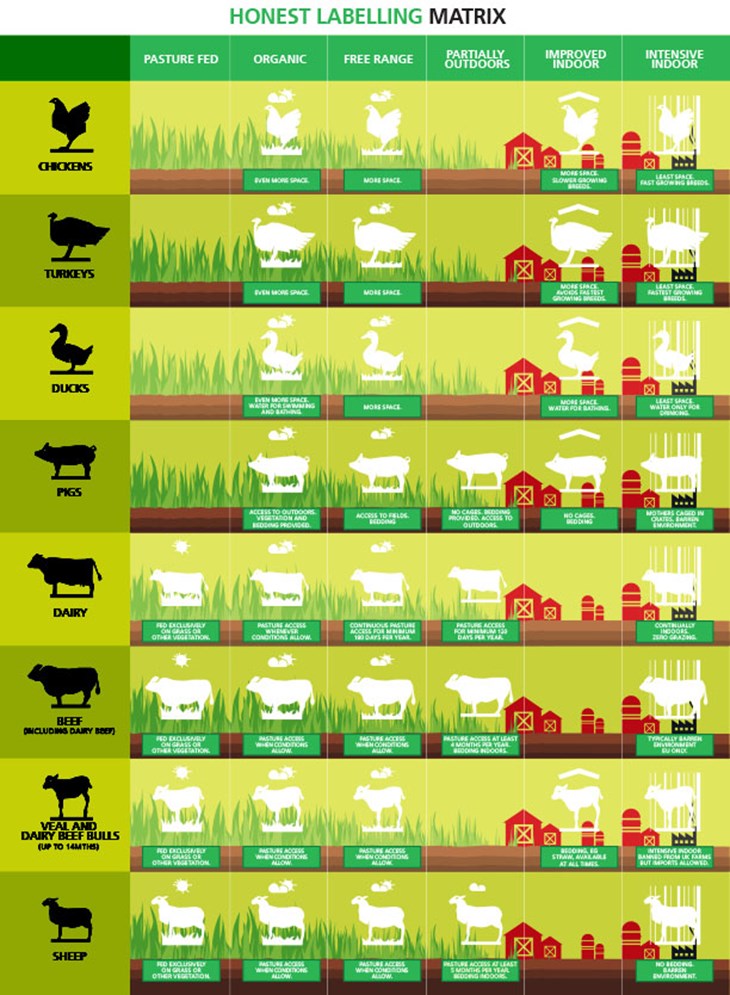
Labelling Matrix
We have worked with and consulted a variety of experts to develop our proposed method of production labelling scheme. These labels would give shoppers an immediate, clear understanding of the farming system used to produce meat and dairy products. Every meat or dairy product would have to carry one of the labels below as a minimum, ensuring that every shopper can make an informed choice. Assurance scheme labels, like RSPCA Assured, would provide valuable information in addition to the method of production, giving a fuller picture of the life of the animal.
In a nutshell: we propose a six-tier labelling scheme. This must have clear descriptions of the farming system and, ideally, also a number to help consumers understand the different systems.
Take a look at our infographic and explore the different type of labels we are proposing and what they mean.

Intensive Indoors This label is for products from animals raised in systems which only meet legislative minimum requirements, or go slightly beyond but not enough to meet the requirements of Improved Indoor. Compassion would describe these animals as being factory farmed. They are likely to live in barren conditions, suffer mutilations and overcrowding – and never go outside.
Improved Indoors This label is for products from animals kept in indoor systems, with some improvements. For example, they will have slightly more room to move around, better bedding and some enrichment to alleviate boredom in their otherwise sterile environment. This system is a step up from Intensive Indoors, but still is wholly indoors and does not enable the animal to perform all its natural behaviours. Slower growing breeds must be used.
Partially outdoors This label is for animals who live outdoors for part of the year, or part of their life, but not long enough to merit a Free Range label. Outdoor access allows animals to perform more natural behaviour, and enjoy better health. For example, studies show that dairy cows with access to grazing can have lower instances of mastitis and lameness.
Free Range This is an existing label used widely across many types of products. The main criteria for this label is that animals have access to the outdoors, including pasture for grazing animals, vegetation and soil for rooting or scratching. It also ensures amenities like roosts for chickens or straw bedding for pigs.
Organic This is an existing label with a legal definition. It has several requirements which must be met before a farm and its produce can be officially deemed 'organic.' Meeting these government-mandated standards will usually provide a higher quality of life for the animal and lower environmental impacts.
Pasture Fed This is for animals who are raised in Free Range or Organic systems and fed on a natural diet, based on grass and vegetation and not including grain. In our scheme, the existing Free Range and Organic labels, which are defined in law, would continue to be used. Pasture Fed is our highest ‘tier’ and applies only to herbivores.
Take Action
- Find out more about the Honest Labelling campaign
- Read our guide to existing voluntary labelling and assurance schemes
The benefits of honest labelling are widespread:
- Empowering for consumers – 8 out of 10 British consumers want to know how farm animals are reared. Clear labels allow informed choices as they can see how the animal was raised – not misled into believing it’s high welfare.
- Fairer for farmers – those that work hard for higher welfare standards will be recognised with clear labelling and protected from lower welfare imports, many of which use labels that suggest higher welfare systems.
- Better for retailers – many retailers are already recognising the value of giving their customers clear information so they can make informed choices when shopping.
- Improves the lives of billions of animals each year – the introduction of mandatory egg labelling proves that when we are informed, many of us make higher welfare choices.
